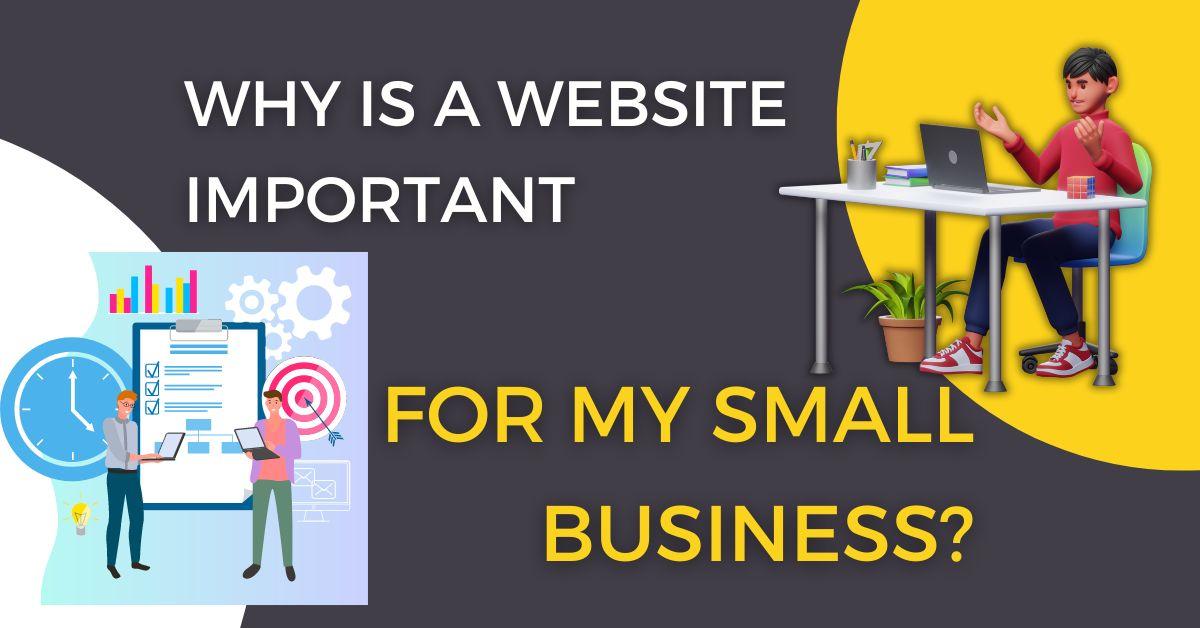
In the ever-evolving landscape of the digital age, the significance of an online presence for businesses cannot be overstated. For small to medium enterprises, stepping into the digital world is not just an option but a crucial step towards sustainable growth and success. While traditional brick-and-mortar establishments continue to hold their value, the vast digital marketplace offers unparalleled opportunities for businesses to expand their reach, connect with customers, and compete in the global arena.
The importance of a website for small businesses goes beyond mere online visibility. It serves as the cornerstone of your digital identity, offering a platform where your brand’s voice, values, and offerings converge to create a lasting impression on your audience. Whether you’re a local coffee shop, a budding tech startup, or a niche service provider, a well-crafted website is your ticket to not only being found online but also to building credibility, engaging with customers, and driving business growth.
In this blog post, we will delve into the various reasons why a website is a fundamental tool for your business. From establishing credibility to expanding your market reach, enhancing customer engagement, and gaining valuable insights – we’ll cover the pivotal roles a website plays in elevating your business in the digital sphere. So, let’s explore how a digital presence can transform your small business and why it’s an investment worth making.
In this digital era, a business without a website often goes unnoticed. The reality is stark: in a world where over 4.6 billion people use the internet, your digital presence is as crucial as your physical one, if not more. A website acts as a beacon in the digital universe, guiding potential customers to your services and products. It’s not just about having an online address; it’s about establishing a digital home base that encapsulates the essence of your business.
For small to medium businesses, a website is a powerful tool to level the playing field. It offers a unique platform to compete alongside larger corporations, providing an opportunity to showcase what makes your business unique. In an age where consumers often first search online for products and services, being absent from this space can mean missed opportunities.
A website does more than just sell products or services; it builds a narrative around your brand. This narrative helps in creating a connection with your audience, which is vital for customer loyalty and brand recognition. Whether it’s sharing your brand’s story, highlighting customer testimonials, or showcasing your portfolio, a website serves as a dynamic and interactive brochure of your business.
Moreover, the scalability and flexibility offered by a website are unparalleled. As your business grows, your website can evolve to meet changing needs. From integrating e-commerce capabilities to offering new content or features, it adapts to your business strategy and goals.
In the following sections, we will explore the multifaceted benefits of a website for small businesses, emphasizing how it can build credibility, expand market reach, enhance customer engagement, and provide valuable insights for business growth.
01

Building Your Business Credibility
In the digital age, a website is more than just an online representation of your business; it’s a powerful tool for building credibility. This is especially crucial for small to medium businesses looking to establish themselves in a competitive market. Here’s how a website contributes to enhancing your business’s credibility:
Establishing Professionalism
- First Impressions Count: Your website is often the first point of contact with potential customers. A professional, well-designed site creates a positive first impression, signaling that your business is legitimate and trustworthy.
- Brand Consistency: A website allows you to control how your brand is presented. Consistent branding across your website – from colors to logos to messaging – reinforces your business’s identity and professionalism.
Showcasing Your Expertise and Offerings
- Portfolio and Services: Your website is the perfect platform to showcase your work, expertise, and the services or products you offer. Detailed descriptions, high-quality images, and case studies can highlight your competencies and experience.
- Customer Testimonials and Reviews: Featuring customer testimonials and reviews on your website enhances trustworthiness. Positive feedback from past customers validates your business and services in the eyes of new visitors.
Enhancing Accessibility and Communication
- Always Open: Unlike a physical store with fixed hours, your website is accessible 24/7. This accessibility shows that you’re always ready to engage with customers, provide information, and accept inquiries or orders.
- Easy Contact and Support: Providing clear and easy ways for customers to contact you (such as contact forms, chatbots, and listed phone numbers or email addresses) establishes open lines of communication, essential for building trust and relationships with customers.
Staying Competitive
- Leveling the Playing Field: In today’s market, customers expect businesses to have an online presence. A website ensures you’re not left behind and are competing on an equal footing with others in your industry.
By effectively leveraging your website, you can significantly enhance your business’s credibility. This credibility is fundamental to attracting new customers, retaining existing ones, and achieving long-term success. In the next section, we’ll explore how a website can help in expanding your market reach, taking your business beyond local boundaries.
02

Expanding Your Market Reach
One of the most significant advantages of having a website for your small business is the potential to expand your market reach far beyond traditional boundaries. In this section, we explore how a website can open doors to a broader audience and enable global market access.
Breaking Geographical Barriers
- Global Audience: Unlike a physical store limited to a locality, a website allows you to reach customers worldwide. This global access means your business can attract clients from different countries and cultures, vastly expanding your potential market.
- Local Expansion: Even for businesses focusing on local customers, a website increases visibility within the community. It helps in reaching out to locals who rely on online searches to find local services and products.
24/7 Availability – Your Always-Open Storefront
- Round-the-Clock Operations: Your website operates 24/7, allowing customers from different time zones to access your products or services at their convenience. This continuous availability is particularly beneficial for e-commerce websites, where customers can shop anytime, leading to increased sales opportunities.
- Flexibility for Customers: The convenience of being able to browse, research, and purchase at any hour caters to the modern consumer’s expectation for flexibility and instant access.
Leveraging Digital Marketing
- Wider Marketing Reach: Digital marketing strategies like SEO, social media marketing, and email campaigns can drive significant traffic to your website. These tools allow you to target specific demographics, interests, and regions, making your marketing efforts more efficient and far-reaching. For more insights on the benefits of global market expansion for small businesses, check out this informative article on Fiskl.com.
Overcoming Physical Limitations
- No Physical Constraints: A website is not confined by the physical limitations of a brick-and-mortar location, such as size, rent, or location. This freedom allows for a broader display of products or detailed descriptions of services without the constraints of physical space.
Building a Global Brand
- Brand Recognition: As your website reaches a wider audience, your brand gains more recognition. This global awareness can transform your business from a local entity to a recognized brand, opening up further opportunities for growth and collaboration.
In the next section, we will delve into how a website can enhance customer engagement, turning visitors into loyal customers.
03

Enhancing Customer Engagement
A website is not just a platform for showcasing your products or services; it’s a dynamic space for engaging with your customers. Effective engagement strategies turn visitors into loyal customers and advocates for your brand. Here’s how various website features contribute to enhancing customer engagement:
Interactive Features for Better Engagement
- Responsive Design: A responsive website design ensures that your site looks and functions well on all devices, from desktops to smartphones, providing a seamless user experience.
- Contact Forms: These are essential for facilitating easy communication. Visitors can get in touch with your business, ask questions, provide feedback, or request services directly through the website.
- Call-to-Action (CTA) Buttons: Strategically placed CTAs guide visitors to take desired actions like subscribing to newsletters, downloading resources, or making a purchase. Effective CTAs are crucial for conversion and engagement.
Building Trust and Credibility
- Testimonials and Reviews: Displaying customer testimonials or reviews provides social proof and builds trust. They allow potential customers to read about positive experiences with your products or services, influencing their purchasing decisions.
Leveraging Social Media for Wider Reach
- Social Media Integration: Integrating social media enhances your website’s reach and engagement. It enables visitors to follow your profiles, share content, and engage in conversations about your brand, thereby driving traffic back to your website.
Real-Time Interaction
- Live Chat: Live chat functionality facilitates real-time communication between your business and website visitors. It’s a powerful tool for improving customer service and engagement, allowing immediate assistance and support.
Personalization and Understanding Customer Needs
- According to Salesforce, personalized customer engagement is crucial. It involves using integrated technologies like CRM to tailor content and experiences to customers’ unique needs, thereby keeping pace with rising customer expectations.
- Customer Experience as a Competitive Edge: In today’s market, businesses compete with every other customer experience a consumer encounters. Creating positive experiences that customers want to share is crucial for success.
Tracking and Analytics for Continuous Improvement
- Real-Time Analytics: Tracking web and social analytics helps in optimizing customer engagement strategies. Monitoring metrics like lifetime customer value is essential to understand if the business is effectively engaging customers.
The Shift in Sales Focus
- Growing Existing Customer Relationships: Modern sales approaches focus more on nurturing existing customer relationships rather than just acquiring new customers. This shift recognizes the value of long-term customer engagement.
Quick and Convenient Service Expectations
- Speed of Interaction: Customers expect quick interactions when they contact a company. Many prefer self-service for simple issues, indicating the need for efficient, user-friendly service options on websites.
Evolving Expectations of Personalization
- Adapting to Changing Needs: With advancements in technology, customers expect better personalization. A significant percentage of consumers remain loyal to companies offering more personalized experiences.
For further reading, take a look at these informative articles:
04

Gaining Valuable Insights
- Understanding your customers is key to any business’s success, and a website is a treasure trove of customer insights. Here’s how website analytics can be a game-changer in understanding customer behavior and preferences:
The Power of Website Analytics
- Tracking Customer Behavior: Website analytics tools like Google Analytics allow you to track how visitors interact with your site. You can see which pages they visit, how long they stay, and what actions they take. This data is invaluable in understanding what captures their interest and what doesn’t.
- Identifying Customer Preferences: Analytics can reveal trends in customer preferences, such as the most viewed products or services. This helps in tailoring your offerings to meet customer demands.
Influencing Business Decisions
- Data-Driven Decisions: Armed with data on customer behavior, businesses can make informed decisions. For instance, if analytics show that certain content is highly engaging, you might decide to produce more of that content type.
- Enhancing User Experience: Understanding how users navigate your site can guide improvements in user experience (UX) design, making your website more intuitive and user-friendly.
- Optimizing Marketing Strategies: Insights from your website can inform your marketing strategies. For example, if data shows that certain blog posts drive a lot of traffic, you might use similar topics in your email marketing campaigns.
Continuous Improvement
- Measuring Success: Analytics provide metrics to measure the success of changes you make on your website, like the impact of a new layout or a special promotion.
- Adapting to Changes: Customer preferences can change over time, and analytics help you keep pace with these changes. Regularly reviewing this data ensures your website and strategies remain relevant and effective.
05

Tips for Creating an Effective Business Website
Creating an effective business website requires a blend of aesthetics, functionality, and strategy. Here are key tips to consider:
- User-Friendly Design: Ensure your website is easy to navigate with a clear menu structure and intuitive layout.
- Quality Content: Provide engaging and informative content that resonates with your audience.
- Search Engine Optimization (SEO): Implement SEO best practices to improve your website’s visibility in search engine results.
- Mobile Responsiveness: With the increasing use of smartphones, make sure your website is mobile-friendly, offering a seamless experience on all devices.
- Strong Call-to-Action (CTA): Guide users with clear CTAs, whether it’s to make a purchase, sign up for a newsletter, or contact your business.
Additional Resources
For further reading on the latest in digital trends and the importance of a business website, check out these articles:
- Forbes – Digital Trends
- [HubSpot – Importance of Websites for Business](https://blog.hubspot.com/marketing/the-importance-of-a-website
Conclusion
- In today’s digital era, a website is not just an accessory; it’s a critical tool for the success of any small business. From establishing credibility to expanding market reach, enhancing customer engagement, and gaining valuable insights, a well-designed website can transform your business landscape.If you’re ready to take your business to the next level with a professional, user-friendly, and SEO-optimized website, LasIdeasMkt is here to help. Let’s work together to create a digital presence that reflects the quality and uniqueness of your business. Contact us today to get started on your journey to success in the digital world!
Let’s Start
Branding!
If you need help with developing your brand or you don’t know where to start with social media, feel free to contact us. Alternatively, download our Bright Branding Kit to help you grow them all important branding roots for a healthy thriving business.

